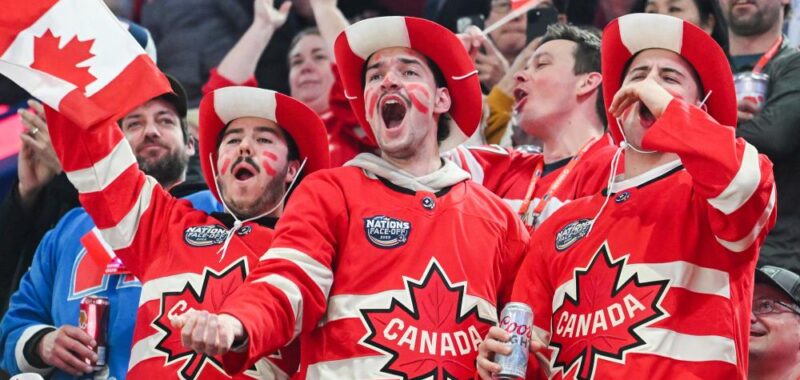
As usual, Canadians approached the latest international hockey tournament, the 4 Nations Face-Off, with worry. Despite top-tier talent and historic winning pedigree, the feeling that Canada could be off its game is a perennial concern. But in 2025, it is particularly profound – mostly because of the Americans.
Since the last time Canada played the US at an elite tournament in 2016, Canadians have watched the American program grow stronger and deeper, while Canada’s own has lost focus. Among the most pressing going concerns has been goaltending. Canada – or Québec more accurately – produced dominant goalies in excess for decades. No longer. They’re all Americans now.
Related: Three fights, nine seconds: USA beat Canada to reach 4 Nations Face-Off final
And the world juniors two months ago didn’t help things. Canada crashed out of that tournament on home ice with a squad few thought accurately represented the country’s top talent (which Hockey Canada, in typical national fashion, all but apologized for this week). Then the Americans won the whole thing (again), with a team that was about as stacked as they could make it.
So, if reputation redemption, or a simple recalibration of hockey dominance, was all that was at stake during Saturday night’s spicy contests between Canada and the US – the Americans came from behind to win 3-1 – it still would have been a doozy. And make no mistake, bragging rights were on the line. But there was more to it.
When it designed the 4 Nations Face-Off tournament, the NHL could never have predicted that this marquee matchup would land at a time of such bilateral political acrimony, nor that the atmosphere both inside and beyond the Bell Centre would be so febrile, nor that everyone would be so worked up about a trade issue that, on the surface, has nothing to do with hockey players. But, thanks to US president Donald Trump, here we are.
Hockey has never been separate from cross-border economics. One way or another, whether in the exchange rate, team relocation or taxes (to name a few recurring issues) the geopolitical Canada-US relationship always echoes around the game. In fact, you could argue that the reason there are such vehement boos of the Star-Spangled Banner – including in Montreal on Saturday – when disputes between the countries arise, is because the relationship is felt even more acutely in hockey than anywhere else. For it is in hockey where the Americans owe Canada the most.
Of all the Canadian exports to the US, the one with the greatest impact to the Canadian psyche is hockey. Oil matters to the Albertans, hydro-electricity to the Quebecois, potash to the Saskatchewanians, and so on. But hockey, well, that’s Canada’s. Nobody else would have it if it weren’t for us. But since its creation, hockey has never been totally Canada’s, because the Americans have always been there. Playing it, sure, but more than anything, monetizing it, commercializing it, and using this Canadian resource to become a powerhouse in their own right. And it has never really seemed fair.
“The Canadian community invests a great deal in the production, as it were, of good hockey players: it creates the social environment that encourages young players to aspire to greatness in the sport and to devote the necessary long hours of practice; it provides him with arenas in which to play and coaches to perfect his skills. The size of the investment is often considerable,” Canadian Olympian and academic, Bruce Kidd, wrote in 1970. Player development (which of course now includes many young girls and women) is a communal investment that should be enjoyed most by that community – but it’s not, he wrote. Instead, the game is sold back to Canadians by Americans. “If not exported directly for sale in the United States, the best games are sold here in Canada under monopoly conditions at outrageous prices.” Canada pumps out hockey players, and the Americans get rich.
In many respects, nothing much has changed in the last 45 years. Canada still maintains a hockey surplus, but it always seems like the Americans benefit from it more than Canadians do. Maybe if we’re talking about retaliatory measures that Canada could take against the US in the near future, hockey should be part of the conversation – say, a 25% tariff added to every Canadian player on an American team, payable to the government of Canada. That’s obviously ridiculous. But so is all of it: the tariff war, the talk of annexation, the canard of cross-border crime. Yet, silly as it is, it has soured things though one hopes not irreparably. After all, we’ll still need someone to play hockey with. Because, as much as hockey belongs to Canada, it would be a lot less fun, and a lot less interesting, if we just kept it to ourselves. It’s why we’ve always shared it with our best friends, forever in each other’s (hockey) debt.

